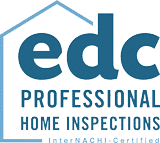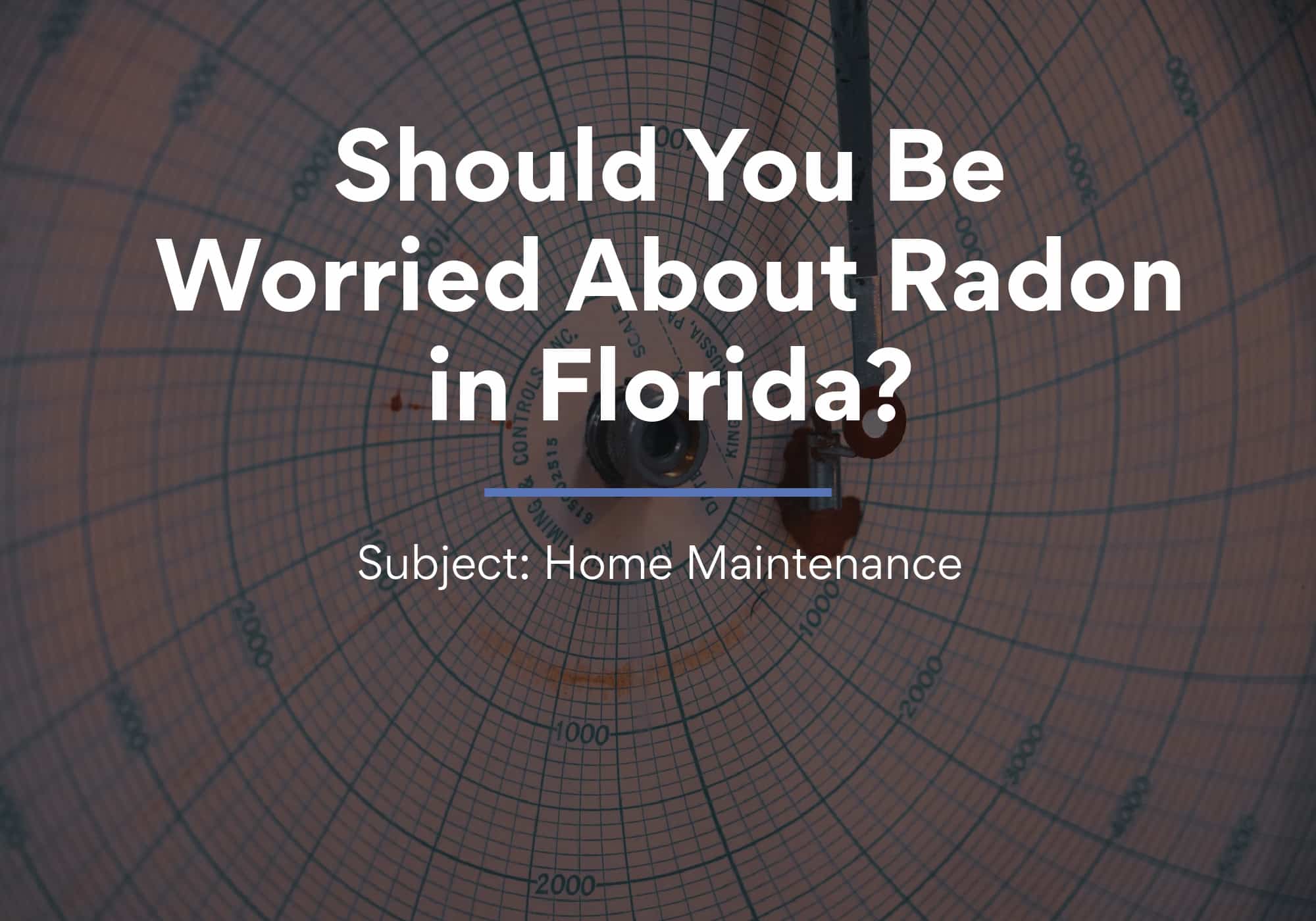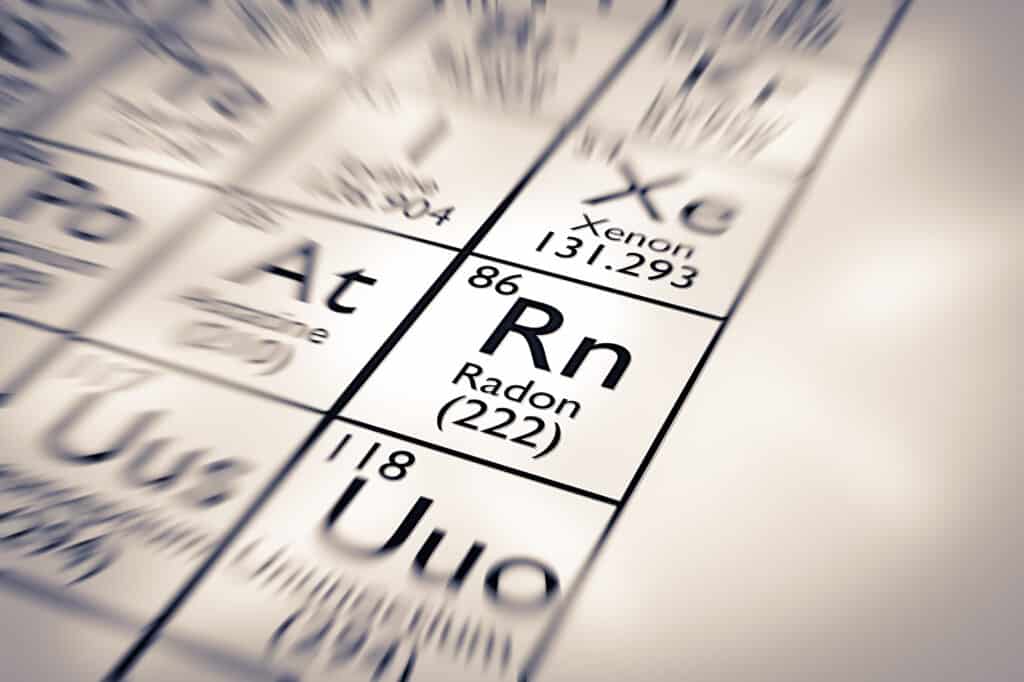This gas is odorless, colorless, and radioactive…
But do you need to be worried about radon in Florida?
A 2023 survey showed that more than ⅔ of Americans stay home more often than they did prior to the Covid-19 pandemic. Because of this, they may be wondering how safe their homes really are.
“Do I have enough flood insurance? Am I taking care of my home properly? Can my roof withstand the next hurricane? Is my home affected by radon?”
In this article, we’re going to talk about what it is, why it’s dangerous, and ultimately, why you probably don’t need to be worried about radon in Florida.
What Is Radon?
Radon is a naturally-occurring, radioactive gas that is odorless, colorless, and tasteless. It forms when natural radioactive materials—such as uranium—break down in the soil or groundwater.
Because it originates from the earth, radon gas is everywhere, albeit in extremely trace amounts. As long as the gas can disperse freely, there is no cause for concern.
However, if the gas finds its way into a building and cannot escape, radon levels can build up to an unsafe level. That’s why there is a waiver to sign when you lease an apartment in Florida. You may not have known that you signed it, but you did.
Is Radon In Florida Dangerous?
As you probably suspected, breathing in large amounts of radioactive gas is not good for you. And the biggest risk when it comes to radon is lung cancer. According to the EPA, radon is the second-leading cause of lung cancer in the United States.
Radon exposure causes no acute symptoms such as breathing difficulties, shortness of breath, or a hoarse voice. Though, if you’re experiencing the above symptoms and have a known exposure to radon, it’s time to consult your doctor.
Radon gas can enter a home in many different ways but it typically accumulates in buildings when:
- There is a source of radon below the structure;
- There are cracks in the foundation; and
- There is no way for the radon to escape.
Because radon cannot be tasted, smelled, or seen, the only way to know your home’s radon levels is to have your home tested.
With proper procedures, radon levels can be reduced up to 99%.
Do I Need to Worry About Radon?
If you live in Central Florida, probably not.
Florida is a very low-risk area for radon exposure, as you can see from the EPA’s Radon Zone Map.
In Central Florida, our substrate (just below our feet) is primarily limestone and sand, rather than granite, which doesn’t result in much risk of radon. (Northern Florida and the panhandle, however, do have granite under the surface, which could produce the decaying isotopes that result in radon.)
Further, because the risk is so low, there aren’t many professionals in the Orlando area that test/inspect for radon. Out of thousands of homes that we’ve inspected in the Central Florida area, we have yet to see one with a radon mitigation system installed.
If you want to set your mind at ease, feel free to have your home tested. The Florida Department of Health offers free radon testing kits for Florida residents, but demand is high. If you don’t want to wait, kits are available online for less than $40.
If the test indicates high levels of radon, you will want to call a radon mitigation specialist to confirm with additional testing.
And if mitigation is needed, don’t panic! The process typically involves repairing cracks in the foundation and installing a ventilation system to remove the gas from the home. If needed, this can be done relatively quickly at an average cost of $1,500.
What If I’m Buying/Selling?
Home inspections are a tried and tested way of checking a home’s condition before you sign on the dotted line. But inspections rarely include a test for radon.
If you have concerns about buying a home with high radon levels, you can always include radon testing as one of the conditions of your offer. (Short-term tests can usually be completed within a week.) Or you can do the testing and mitigation yourself after you move in.
If you’re selling a home, consider a long-term radon test to set buyers’ minds at ease.
Long-term tests take around three months to complete, but are more accurate. And—if it will help your home sell more quickly—they could be worth the cost.
Helping You Breathe Easier
At EDC Professional Home Inspections, we’ve looked “behind the scenes” at hundreds of Florida homes. In our experience, it isn’t radon you should be worried about, but the physical condition of the home.
Purchasing a piece of real estate isn’t like buying a sweater, an appliance, or even a car. There are no return policies on real estate! That’s why it’s so important to get the job done right…the first time.
Our owner Erik Coplin has reached the rank of Master Home Inspector and has the qualifications and experience you need to feel secure in your purchase.
If you’re worried about the condition of the home you’re hoping to purchase, EDC can help you breathe a little easier.
Call today to schedule an appointment.




